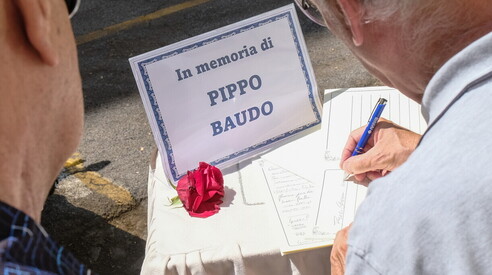No, "pippobaudismo" is not among the new words in the Cambridge Dictionary


LaPresse
summer with Ester
Contemporary language is generated by words heard on TikTok. We must resign ourselves to the existence of phrases like skibidi, delulu, and tradwife, and to the fact that, perhaps, ours truly are the times of maximum abundance.
On the same topic:
What have we done wrong to live in these painful linguistic times? We're good with only one thing: labels. A social quirk makes a fool of itself? We're ready with the catalog. The Lares look at us with disapproval. After Shakespeare and Dante, the future has become this: frenetic communication with nothing to say. I have plenty of new nouns to introduce. Pippobaudism . I thought about it while watching the news: if there's a man who deserves to become a common noun, a generic label, it's Baudo. The founding father of modern telecommunications, he's a total archetype and already a recognized historical figure. Pippobaudism: that kind of propensity for study and strict perfectionism, understood as the only (rather self-sacrificing) way to see, over time, some good results. Sweat and then excel—who knows if that will be liked or even seem fascistic.
Instead, we're stuck with the Cambridge Dictionary and the success of the 2000s, the kind guaranteed on social media on one simple condition: that you go off the deep end. As we were saying, the starred dictionary just yesterday, mid-August, decided to add new official words to its catalog. Contemporary language—we must accept it—is generated by the nonsense we hear on TikTok. We're stuck with skibidi, delulu, and tradwife. Marked down in our notebooks because these are words we'll need; we can't not know, we can't be left behind. A curious unifying detail: does one of the three words mean something good? None. Skibidi is the magical, meaningless formula, frequently used narcissistically in romantic gossip, used to emphasize nothing: "What the skibidi are you doing?" the young man asks life, which always replies skibidi. It comes from Skibidi Toilet, a viral animated video. There's no plot, just human heads popping out of the toilet. The word can mean cool, awful, or simply nothing. It's a kind of interjection, used to reinforce an immediate and fleeting emotion. To be unnecessarily scientific, it's the epitome of the rapid communication we're used to, an exclamation into the void. Let's give it the same test we use for all things in life to determine whether they're worth keeping: is it beautiful? Is it useful? No.
Delulu (word number 2) comes from K-pop, the updated Asian rip-off of what Take That and the Spice Girls were in the '90s, ditties from after-school TV shows, identical to the delusions of twelve-year-olds but with less character. Delulu was a fan who wanted to seduce his idol through the power of his mind, armed with an intense desire. You love me because I believe in you. It's the army of Candides we can afford. Today, delulu appears in the world's dictionaries and becomes the symbol of the most beautiful illusion we had: dreaming that reality is secondary to desires. Believing in the false: what's happier, for a heart? Nothing. The label generation has invented and perfected yet another: tradwife . It would be the old familial and amoral conservatism. They are the girls of seven centuries ago, happy to clean the house and look after children and husbands. Videos are rampant on social media: being a housemaid with a rag in hand is a great lifestyle aspiration. Here we return to polite servants and the old male commander on the sofa. These are truly times of plenty, Calvino was right. If we're here making new chapels in the sanctuary of useless words, it means we truly have better lives than anyone who came before . Perhaps the general problem is precisely that: that to see a real problem we have to turn on the television.
More on these topics:
ilmanifesto





